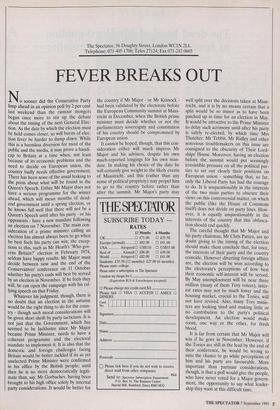The Spectator, 56 Doughty Street, London WC1N 2LL Telephone: 071-405
1706; Telex 27124; Fax 071-242 0603
FEVER BREAKS OUT
o sooner did the Conserative Party limp ahead in an opinion poll by 2 per cent last weekend than the rumour mongers began once more to stir up the debate about the timing of the next General Elec- tion. As the date by which the election must be held comes closer, so will bursts of elec- tion fever be harder to damp down. While this is a harmless diversion for most of the public and the media, it may prove a handi- cap to Britain at a time when, not least because of its economic problems and the need to decide on European union, the country badly needs effective government. There has been none of the usual leaking to the press about what will be found in the Queen's Speech. Either Mr Major does not have a serious programme for the winter ahead, which will mean months of dead- end government until a spring election, or he knows full well that there will not be a Queen's Speech until after his party - or his Opponents. have a new mandate following an election on 7 November. The main con- sideration of a prime minister calling an election has almost always been to go when he best feels his party can win; the excep- tions to this, such as Mr Heath's 'Who gov- erns Britain?' election in February 1974, seldom have happy results, Mr Major must decide between now and the end of the Conservatives' conference on 11 October whether his party's ends will best be served by an election in November. If he feels they will, he can open the campaign with his ral- lying speech on that Friday. Whatever his judgment, though, there is no doubt that an election in the autumn would be the right thing to do for the coun- try - though such moral considerations will be given short shrift by party tacticians. It is not just that the Government, which has seemed to be lacklustre since Mr Major became Prime Minister, needs to have a coherent programme and the electoral mandate to implement it. It is also that the domestic and foreign challenges facing Britain would be better tackled if its as yet unelected Prime Minister were confirmed in his office by the British people; until then he is no more democratically legiti- mate than, say, Mr Gorbachev, having been brought to his high office solely by internal party considerations. It would be better for the country if Mr Major - or Mr Kinnock - had been validated by the electorate before the European Community summit at Maas- tricht in December, when the British prime minister must decide whether or not the parliamentary sovereignty and constitution of his country should be compromised by European union.
It cannot be hoped, though, that this con- sideration either will much impress Mr Major and his advisers, despite his own much-reported longings for his own man- date. In making his choice of the date he will certainly give weight to the likely events of Maastricht, and this (rather than any sense of political propriety) may propel him to go to the country before rather than after the summit. Mr Major's party may well split over the decisions taken at Maas- tricht, and it is by no means certain that a split would be so minor as to have been patched up in time for an election in May. It would be attractive to the Prime Minister to delay such acrimony until after his party is safely re-elected, by which time Mrs Thatcher, Mr Tebbit, Mr Ridley and other notorious troublemakers on this issue are consigned to the obscurity of Their Lord- ships' House. Moreover, having an election before the summit would put seemingly irresistible pressure on all the political par- ties to set out clearly their positions on European union - something that, so far, only the Liberal Party has had the courage to do. It is unquestionably in the interests of the two main parties to obscure their views on this controversial matter, on which the public (like the House of Commons itself) does not divide on party lines. How- ever, it is equally unquestionably in the interests of the country that this obfusca- tion should end quickly.
The careful thought that Mr Major and his party chairman, Mr Chris Patten, are no doubt giving to the timing of the election should make them conclude that, for once, the interests of their party and the country coincide. However diverting foreign affairs are, the election will be won according to the electorate's perceptions of how best their economic self-interest will be served. By May unemployment will be near three million (many of them Tory voters), inter- est rates may not be much lower and the housing market, crucial to the Tories, will not have revived. Also, many Tory minis- ters are looking tired and making little or no contribution to the party's political development. An election would make room, one way or the other, for fresh blood.
It is far from certain that Mr Major will win if he goes in November. However, if the Tories are still in the lead by the end of their conference, he would be wrong to miss the chance to go while perceptions of him and his party are favourable. More important than partisan considerations, though, is that a poll would give the people, who have never voted for a Major govern- ment, the opportunity to say what leader- ship they want at this difficult time.


















































 Previous page
Previous page